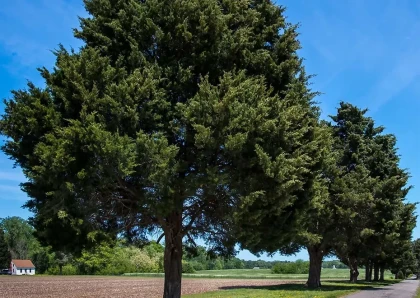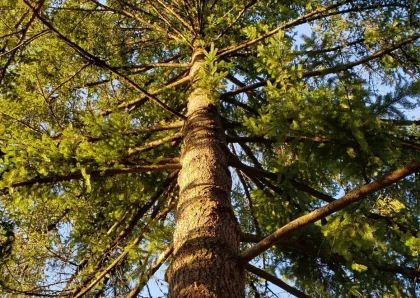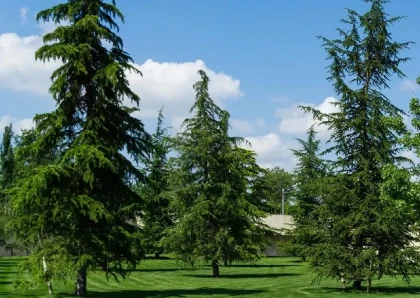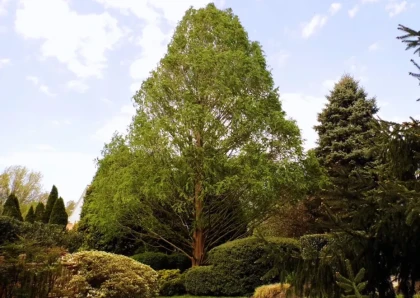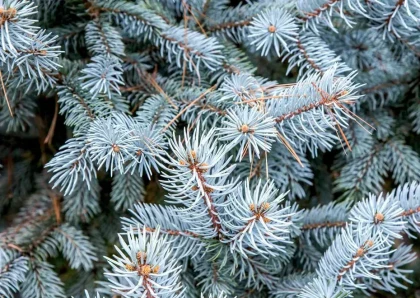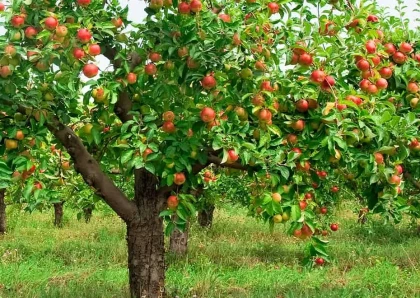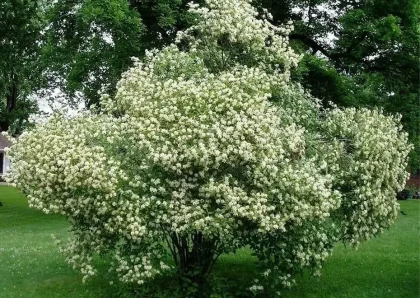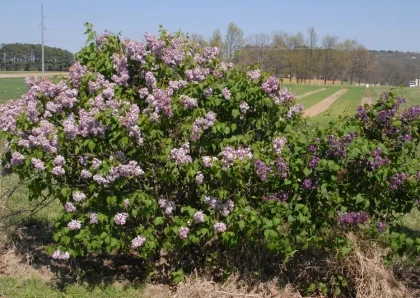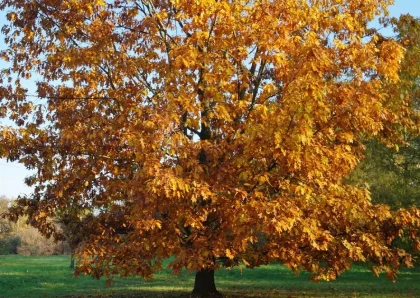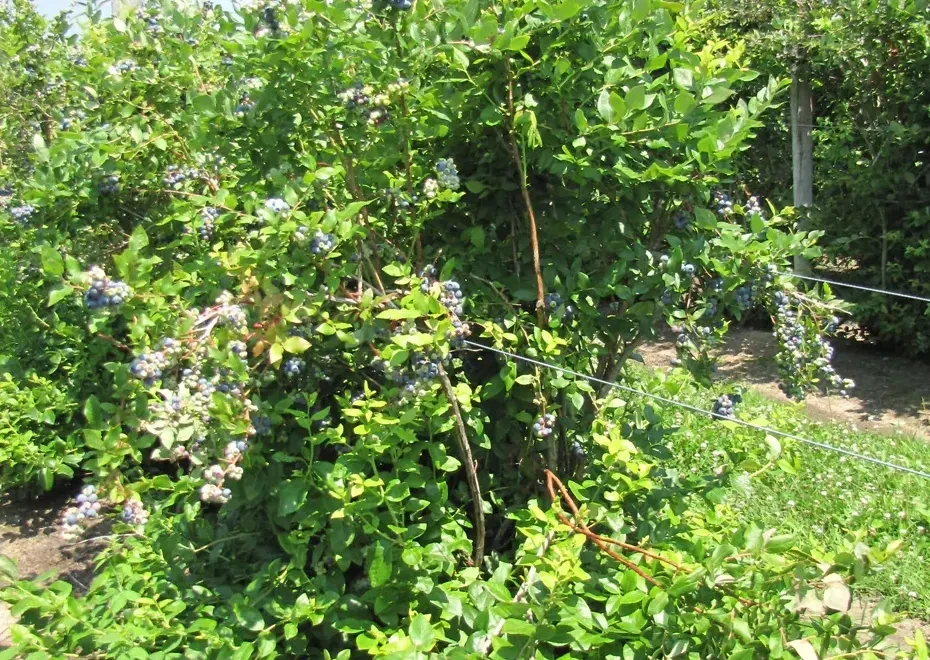
Duke Blueberry Bush
Overview
Duke Blueberry Bush, scientifically known as Vaccinium corymbosum 'Duke', is an outstanding blueberry variety celebrated for its remarkable flavor and prolific fruit production. This deciduous shrub is part of the Vaccinium corymbosum species, which includes other well-known blueberry cultivars. Duke blueberries stand out for their sizable and firm berries that boast an enticing combination of sweetness and tartness.
The berries produced by Duke Blueberry Bush are highly sought after for their exceptional flavor profile. Each juicy bite offers a delightful balance of sweetness and tanginess that delights the taste buds. The large size and firm texture of the berries contribute to their overall appeal, making them perfect for enjoying fresh, incorporating into various recipes, or preserving for later use. Duke blueberries are a favorite choice for baking pies, muffins, and other delicious treats, as well as for creating flavorful jams and jellies.
With its abundant fruit production, Duke Blueberry Bush offers a generous harvest year after year. This makes it an excellent choice for home gardeners and small-scale growers who desire a bountiful supply of delicious blueberries. The plant's productivity, coupled with its impressive flavor and versatility in culinary applications, makes Duke Blueberry Bush a highly desirable addition to any garden or landscape.
Different Types of Duke Blueberry Bush
Duke Blueberry Bush is a specific cultivar within the Vaccinium corymbosum species. While there are no distinct variations of Duke blueberries, different strains and clones of this cultivar may exhibit slight variations in fruit size, flavor intensity, and cold hardiness.
Different Types of Wood Products from Duke Blueberry Bush
While Duke Blueberry Bush is primarily cultivated for its delicious berries, the wood can also be utilized in certain woodworking projects. The wood of blueberry bushes is often valued for its unique patterns and can be used for decorative purposes, such as crafting small items like cutting boards, tool handles, or even furniture accents.
Benefits of Duke Blueberry Bush
- Flavorful Berries: Duke blueberries offer a delectable flavor profile, combining sweetness and tanginess. They are perfect for fresh consumption, baking in pies, making jams, or adding to various recipes.
- Abundant Fruit Production: Duke Blueberry Bush is known for its generous yields, providing ample berries for harvest each season. Its productivity makes it an ideal choice for home gardeners and small-scale growers.
- Cold Hardiness: This blueberry variety exhibits good cold hardiness, allowing it to thrive in regions with colder winters. It can withstand temperatures as low as -20°F (-29°C), making it suitable for a wide range of climates.
- Health Benefits: Blueberries, including Duke blueberries, are rich in antioxidants and various nutrients, known for their potential health benefits. They are a great addition to a balanced diet and contribute to overall well-being.
Cons of Duke Blueberry Bush
- Soil Requirements: Duke Blueberry Bush prefers acidic soil with a pH between 4.0 and 5.5. Adjusting the soil pH and providing proper amendments may be necessary in some regions to create suitable growing conditions for this blueberry variety.
- Pollination: While Duke Blueberry Bush is self-pollinating, cross-pollination with another blueberry cultivar can improve fruit set and yield. Planting multiple blueberry varieties in close proximity can enhance pollination and increase productivity.
Tips for Planting and Maintaining Duke Blueberry Bush
- Planting: Choose a sunny location with well-drained, acidic soil. Prepare the planting hole to accommodate the root ball and amend the soil as needed to ensure proper drainage and acidity levels.
- Pruning: Regular pruning is essential to maintain a healthy and productive Duke Blueberry Bush. Prune in late winter or early spring to remove dead or damaged branches and promote new growth.
- Watering: Provide consistent and deep watering, especially during dry spells and throughout the growing season. Blueberry bushes require moist soil but should not be waterlogged.
- Mulching: Apply a layer of organic mulch around the base of the bush to conserve moisture, suppress weeds, and maintain a more stable soil temperature.
Conclusion
Duke Blueberry Bush is a valuable addition to any garden, offering an abundance of flavorful berries and potential health benefits. With proper care, this productive and cold-hardy shrub can provide years of delicious harvests. Whether enjoyed fresh, used in culinary creations, or preserved for later use, the sweet-tart flavor of Duke blueberries is sure to delight.
FAQs
- Can Duke blueberries be grown in containers?
- Is Duke Blueberry Bush self-pollinating?
- How tall does Duke Blueberry Bush grow?
- When is the best time to harvest Duke blueberries?
- How do I protect Duke blueberries from birds?
Yes, Duke blueberries can be successfully grown in containers, provided they have sufficient space, proper soil mix, and appropriate care.
Yes, Duke Blueberry Bush is self-pollinating, but planting other compatible blueberry varieties nearby can enhance pollination and increase fruit production.
Duke Blueberry Bush typically grows to a height of 4-6 feet (1.2-1.8 meters), making it suitable for small gardens or container cultivation.
Duke blueberries are typically ready for harvest in mid to late summer, depending on the specific climate and growing conditions
To protect your Duke blueberries from birds, you can use netting or bird scare devices to deter them from accessing the berries.
No listings available
Related Products
Questions & Answers
What do you want to know about this product?
Reviews (5)
BerryEnthusiast25
A Blueberry Dream Come True
Duke Blueberry Bush exceeded my expectations with its abundant, flavorful berries. A must-have for any blueberry lover's garden!
FruitfulHarvester
Bountiful Harvests Every Year
Duke Blueberry Bush never disappoints, delivering generous yields of delicious blueberries season after season. A true gem in my garden!
BlueberryConnoisseur
Perfectly Balanced Flavor
The flavor of Duke blueberries is simply outstanding - a harmonious blend of sweetness and tanginess. Truly a taste sensation!
FrostproofGrower
Cold Hardy Champion
Duke Blueberry Bush's exceptional cold hardiness impressed me as it thrived through freezing temperatures and still produced abundant berries.
GardenGourmet
A Feast for the Eyes and Taste Buds
Duke Blueberry Bush not only graces my garden with its beautiful blooms but also treats me to a bounty of delicious and nutritious berries.






